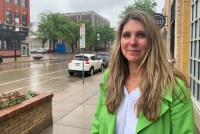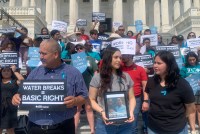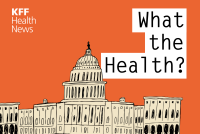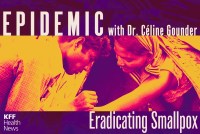Latest Morning Briefing Stories
In Wisconsin, Women’s Health Care Is Constricted by an 1849 Law. These Doctors Are Aghast.
From the front lines of Wisconsin’s abortion battle, obstetricians describe patients who cannot comprehend having to carry nonviable pregnancies. And only one pharmacist in town can be found who will fill prescriptions for abortion pills.
Texan Activists Thirst for a National Heat Standard to Protect Outdoor Workers
As much of the U.S. faces extremely high summer temperatures, Texas’ Republican governor, Greg Abbott, has taken steps that effectively eliminate mandated water breaks for construction workers. In response, protesters from the Lone Star State came to Washington, D.C., to press for federal protections for such outdoor workers.
KFF Health News' 'What the Health?': Another Try for Mental Health ‘Parity’
President Joe Biden is kicking off his reelection campaign in part by trying to finish a decades-long effort to establish parity in insurance benefits between mental and physical health. Meanwhile, House Republicans are working to add abortion and other contentious amendments to must-pass spending bills. Joanne Kenen of the Johns Hopkins Bloomberg School of Public Health and Politico, Anna Edney of Bloomberg, and Sarah Karlin-Smith of the Pink Sheet join KFF Health News’ chief Washington correspondent, Julie Rovner, to discuss these issues and more. Also this week, Rovner interviews KFF Health News’ Céline Gounder about her podcast “Epidemic.” The new season focuses on the successful public health effort to eradicate smallpox.
FDA Head Robert Califf Battles Misinformation — Sometimes With Fuzzy Facts
FDA Commissioner Robert Califf has called misinformation one of the deadliest killers in the United States. As the FDA tries to fight that scourge, it sometimes stumbles.
KFF Health News' 'What the Health?': Let’s Talk About the Weather
2023 will likely be remembered as the summer Arizona sizzled, Vermont got swamped, and nearly the entire Eastern Seaboard, along with huge swaths of the Midwest, choked on wildfire smoke from Canada. Still, none of that has been enough to prompt policymakers in Washington to act on climate issues. Meanwhile, at a public court hearing, […]
Epidemic: The Goddess of Smallpox
To defeat smallpox in South Asia, public health workers had to navigate the region’s layered cultural ideas about the virus. They also dreamed big. In Episode 1, host Céline Gounder wonders how the U.S. might tap into similar “moral imagination” to prepare for the next public health crisis.
How a Combination of Covid Lawsuits and Media Coverage Keeps Misinformation Churning
Even as the covid-19 pandemic wanes, litigation — whether about vaccines, masks, or a range of other public health policies made during the pandemic — isn’t about to end.
Got Milk in School? Farmers Fight Health Advocates Over the Creamy ‘Whole’ Variety
It has been over a decade since whole milk was served in schools through the National School Lunch Program, after U.S. government dietary guidance effectively banned it. But dairy farmers, some health experts, and members of Congress say it’s time to bring it back.
Proposed PFAS Rule Would Cost Companies Estimated $1B; Lacks Limits and Cleanup Requirement
A proposed Environmental Protection Agency rule calls for companies to disclose PFAS manufactured or imported since 2011. The chemical industry is upset because such compliance would cost an estimated $1 billion, while environmental health advocates worry because the rule wouldn’t ban the chemicals outright.
CDC to Reduce Funding for States’ Child Vaccination Programs
Citing the recent debt ceiling deal, the CDC is trimming its funding to child vaccination programs that focus on communities vulnerable to disease outbreaks. The cuts come despite data showing the percentage of children getting vaccinated has dropped in recent years.













